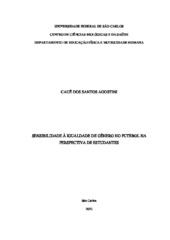Sensibilidade à igualdade de gênero no futebol na perspectiva de estudantes
Resumo
The present study has as its starting point a cooperation agreement and the transposition to the Brazilian context of the questionnaire created by Spanish researchers called Escala de Actitudes Hacia la Igualdad de Género en el Fútbol Escolar, divided into a part that collects sociodemographic data, and others three blocks: sociocultural, relational and perceived motor competence, using the Likert scale. We established as a general objective of our work the analysis of opinions, positions and attitudes of students in the final years of Elementary School and High School in relation to gender equality in football in the school environment and high performance. From this, the specific objectives emerge (1) to categorize the profiles of the research participants into groups/clusters based on their responses; (2) establish categories of analysis based on the “sociocultural” block of statements from the EAIGFU questionnaire and analyze how each group of participants positions itself in relation to each theme. (3) To analyze the behavior of the participants relating the answers obtained in the sociocultural block with the answers in the “relational” and “perceived driving competence” blocks of the EAIGFU questionnaire. (4) Point out potential studies or lines of research on the topic or similar topics that can contribute to this category of research and to the understanding we have about football at school, mentioned above. This research is a descriptive and correlational study, which used a research technique called “snowball sample”. The collection took place during the year 2019 and we obtained 187 questionnaires answered by children and adolescents between 12 and 18 years old. To analyze the data obtained, we used statistical software called Statistical Pachage for Social Sciences and performed the following steps: (1) grouping the participants' profiles into clusters (groupings); (2) characterization of clusters based on sociodemographic indicators; (3) thematic categorization of the sociocultural block and analysis of clusters by thematic category; (4) analysis of relational blocks and perceived motor competence. We noticed structural issues related to the students' perception of the manifestation of sexism in the classroom environment or in the high performance environment, depending on the characteristics of each cluster, where one of them, labeled as the most sexist cluster, was composed of more boys and students from public schools and the other, identified as more egalitarian, had mostly girls and students from private schools. Based on the results and reflections, we realized the importance of future studies contemplating plural masculinities and femininities and/or the intersectionality between the category gender and race/ethnicity, class, among others. Therefore, multiple and comprehensive looks at the manifestations of identities are important for the structuring of a football where marginalized groups can assume the leading role of the practice, appropriating a strong and rooted element in Brazilian culture.
Collections
Os arquivos de licença a seguir estão associados a este item:

